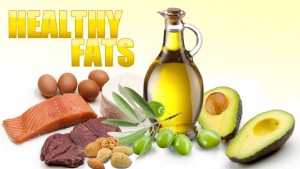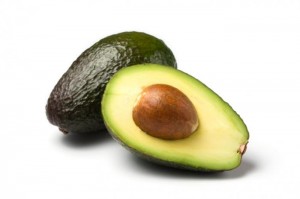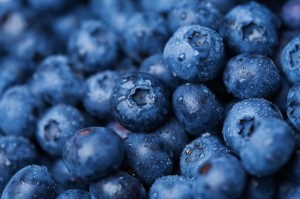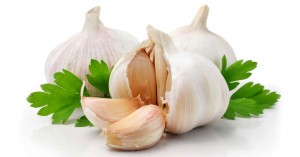by Melody Garza MS RD CISSN
Yup you heard right, the best fats for getting lean. You might think that to lose weight, you need to cut the fat out of your meals. After all, fat is higher in calories than protein and carbs, and low-fat diets have been popular since the Senate Nutrition Committee first recommended them in the late 1970s. But research shows that a moderate-fat diet (with about 35 percent of calories consumed coming from fat) will help you drop pounds permanently, feel full longer, and avoid bingeing. The trick is to eat the right kind of fat to increase satisfaction and boost weight loss. Here’s why it’s important to eat fat and the five of the best fat sources to add to your diet.
How eating fat will help you lose fat.
In 2008, researchers at Ben-Gurion University of the Negev in Israel found that people who followed low-fat diets lost less weight than people who followed low-carb or moderate-fat diets. The low-fat group lost an average of 6.5 pounds over 2 years, but the low-carb and moderate-fat groups lost about 10 pounds. Women did especially well on the moderate-fat diet, losing an average of 13 pounds during the study.
Fat is an important element in weight loss for several reasons:
- Fat helps your body control blood sugar and insulin spikes after eating carbohydrates. Better sugar metabolism means less fat storage.
- Fat slows down digestion and aids nutrient absorption. You’ll stay fuller longer and get more health benefits from the food you eat.
- Essential fatty acids (like omega-3s) may boost your metabolic rate and increase fat burning.
- Fat tastes good. It also provides a “mouthfeel” that is satisfying, which can help you be happy with less food.
Eating more fat may also help you stick to your diet longer. In a study conducted by Brigham and Women’s Hospital in Boston, participants got either 20 percent of their calories from fat or 35 percent of their calories from fat. After 6 months, both groups had lost weight. But after 18 months, only 20 percent of the people in the low-fat group were still following the diet, compared with 54 percent of the people in the moderate-fat group. Likewise, the subjects in the moderate-fat group had maintained their weight loss, while the low-fat group participants had gained most of the weight back.
If you reach for a box of low-fat or fat-free crackers or cookies because you want to lose weight, you may actually be sabotaging your diet. Manufacturers frequently replace fat with sugar in packaged food items to make them taste better. You think you’re making a good decision by eating fat-free products, but the excess sugar and refined flour can lead to fatigue, cravings, mood swings, and weight gain caused by the overproduction of insulin—the fat-storage hormone. As a snack, a sliced apple with some peanut butter or a salad with oil and vinegar dressing would be a better weight loss choice. The complex carbs and healthy fats will maintain your blood sugar levels, boost your energy, and keep you satisfied longer.
What kind of fat should you eat?
To get lean, you need to eat the right kind of fat. Avoid saturated and trans fats (which are found in red meat, full-fat dairy products, and many packaged foods), and instead choose monounsaturated and polyunsaturated fats. Here are some of the best sources of fat to help you reach your weight goal.
Fish – Fish like salmon, albacore tuna, herring, mackerel, and sardines contains beneficial amounts of omega-3 fatty acids. Most experts agree that eating two servings of fatty fish per week is safe for people who are worried about mercury or other toxins. (Pregnant women should consult with their doctors about consuming fish.) If you don’t like fish, a quality supplement like Beachbody’s Core Omega-3™ will give you the benefits without the fishy taste.
Olive oil – Heart-healthy oils like olive, canola, and peanut oil are excellent sources of fat for dieters. They have also been shown to lower bad cholesterol and reduce the risk of heart disease. Use them sparingly when sautéing, or drizzle them over your favorite salad or vegetables with a little vinegar and some herbs to maximize the absorption of nutrients. Moderation is important: You really only need about a teaspoon of oil to get all its benefits. Using more will add significant calories.
Avocados – Eat a spinach and carrot salad with a little avocado, and you’ll not only get a dose of good fat, but you’ll also absorb more phytonutrients like lutein and beta-carotene. Scientists  at Ohio State University in Columbus found that more antioxidants were absorbed when people ate a salad containing avocados than when they ate a salad without this tasty fruit. One-quarter of an avocado will add flavor while only adding about 75 calories.
at Ohio State University in Columbus found that more antioxidants were absorbed when people ate a salad containing avocados than when they ate a salad without this tasty fruit. One-quarter of an avocado will add flavor while only adding about 75 calories.
Nuts – Almonds, walnuts, pecans, and peanuts are powerhouses of good nutrition—full of antioxidants, minerals, and monounsaturated fat. The Nurses Health Study, where more than 86,000 nurses were followed for 14 years, found that those who ate nuts regularly (about an ounce per day) tended to weigh less than those who didn’t. The protein, fat, and fiber make nuts more filling, which helps dieters stay on track. Plus there’s a psychological bonus to eating nuts: Because they’re rich and satisfying, you probably won’t feel like you’re on a diet.
Flaxseeds Packing the triple wallop of fat, protein, and fiber, flaxseeds are a delicious and healthful addition to any diet. You can grind them up and add them to oatmeal, yogurt, salads, or vegetables, or pretty much anywhere you want a nutty crunch. They’re a plant source of omega-3 fatty acids, making them a good choice for vegetarians or the aforementioned non-fish-loving folks. Ground flaxseeds also have 3 grams of fiber per tablespoon, which helps slow digestion and keep your blood sugar stable.
Making room for fat Certain fats might be considered necessary for health, but that’s not a cue to overindulge. At 9 calories per gram, fat is a more concentrated energy source than either protein or carbohydrates (each has 4 calories per gram). You need to be mindful of your overall caloric intake if you want to eat more fat and lose weight. But when you feel full and satisfied after eating the right kinds of fat, you’ll probably find it a bit easier to manage your calories.
BIO – Melody Garza MS RD CISSN – First & foremost, Melody Garza is a daughter, sister, aunt, girlfriend, best friend, & athlete … without these core roles, there would be an inability for her to triumph as a successful entrepreneur. Melody was born in Mexico & grew up in Texas; however, her life is on the sunny beaches of Florida now. She is a Registered Dietitian with a Bachelors’ degree in Kinesiology and Sports Science, a Masters in Nutrition and Dietetics, licensed as a massage therapist/colon hydrotherapist, and a Certified Sports Nutritionist with the International Society of Sports Nutrition. Melody Garza was a 3-sport athlete at the high school level and continued as a 2-sport athlete in college. Now, she plays beach volleyball competitively; winning several women and coed tournaments. At 23 Melody co-owned an in-home personal training/massage therapy business in Naples, Fl. Although she left the company to pursue a higher education, entrepreneurship is a passion of hers, especially in the wellness industry. Now at 30,Melody offer services ranging from fitness coaching to nutrition counseling; sharing alternative forms of medicine to being environmentally friendly; and business consulting for those who want to work from home. Melody strongly believes in a holistic approach to wellness. Wellness is a life-style that adheres to a balance of health that decreases the likelihood of becoming ill physically, mentally, and spiritually. Comprised of seven dimensions and characteristics, wellness is achieved when a person’s like includes all seven elements in combination and in whole. She is committed to making a difference in people’s lives by helping them achieve total wellness. As a coach and mentor, Melody is more like an accountability partner. She’s been through the journey of seeking total wellness, so Melody doesn’t speak to you as a trainer but rather a voice of experience. For more info, go to www.LiveWellWithMel.com



